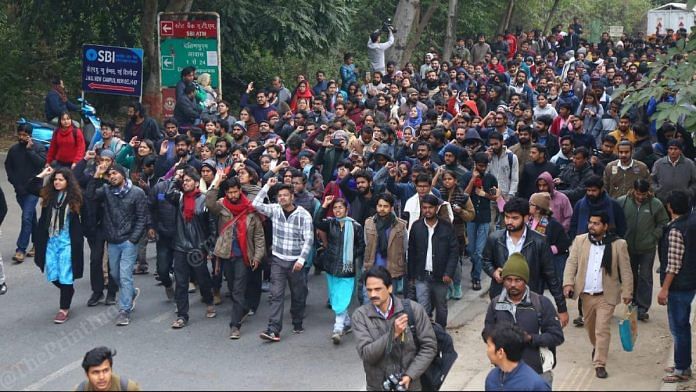Notes from a V-C’s diary
Yoginder K. Alagh | Former vice-chancellor of JNU
The Indian Express
Alagh emphasises the greatness of JNU as an educational institution and writes that instead of destroying it, we should build more such universities.
Through his personal experiences, Alagh states how the university was built bit by bit with the help of its students. He remembers that every night post-dinner, there were hostel meetings over various students’ issues in which the Vice Chancellor had to be present. Every meeting would continue till the problem was solved, he recalls. Alagh adds that the student union at JNU was “one of the most democratic societies in the world”.
Furthermore, he explains that there was no sure shot formula to JNU becoming the first Indian university to be featured among the top 100 universities globally. He notes that a university is built with autonomy and accountability of not just students, teachers and staff but of the administration, the VC and the Ministry of Human Resource Development as well.
He argues that the youth are idealistic and it is good that they want change. The aim should be to create many more JNUs and “nurture the mother JNU,” he concludes.
Betrayals from outside and within
Tabish Khair | Indian novelist and academic
The Hindu
Khair writes that the fight against Islamic State was won with the help of three major forces — the Kurds, Shia militia and ordinary Muslims (Sunni and Shia). In 2019, US president Donald Trump “betrayed the Kurds and abandoned them”. By killing Soleimani, he also betrayed the Shia Militia, writes Khair. He asks what the third force (the ordinary Muslims) should expect in the future from Trump?
Khair writes that the “targeted killing” of General Soleimani by the US has proved that any country can now decide to murder the official of any other country. “Why isn’t this issue being taken up in the otherwise so law-abiding free ‘West’”, he asks.
He argues that Muslims across the world are being pushed to the wall. Even a non-practising Muslim feels that the Muslim tag comes first. Khair writes that now “it will be so easy for the younger generation to fall into the Islamic trap” and resist people like the author who have constantly been emphasising on being a human first.
In conclusion, Khair advises the Muslims to “resist the Islamists and fundamentalists” as they have been intolerant and diverging Muslims within their own land. The core of the crisis is the “narrowness of Muslims themselves and their own understanding about them,” he writes.
A road map for General Rawat
Gurmeet Kanwal | Former director, Centre for Land Warfare Studies (CLAWS)
Hindustan Times
General Rawat’s appointment as the Chief of Defence Staff (CDS) has “fulfilled the long-pending gap in the management of higher defence”, writes Kanwal.
He argues that the main agenda of the CDS should be the formulation of integrated operational directive so that tri-service operational plans can be executed. He gives the example of 1971 war and the Kargil war to throw light on the importance of coordinated efforts across services.
Kanwal writes that next task should be “integrated theatre commands to further optimise the planning and execution of joint operations”. He argues that now it’s important for security decision makers to be given “a single point-military advice” to meet complex emerging challenges in a nuclear environment.
Apart from mentioning other roles of the CDS such as policy planning, information warfare and cyber-security, Kanwal recommends that the armed forces training institutes should also be placed under the direct command of the CDS. He suggests that the respective chiefs of the army, navy and air force continue to oversee the development and acquisition of weapons and equipment. In conclusion, he suggests that a vice-chief of the defense staff should have been appointed to head the newly created Department of Military Affairs.
The darkening sky
Shankar Acharya | Honorary professor at ICRIER & former chief economic adviser to the Government of India.
Business Standard
“2019 was not a good year, either for global cooperation, the world economy or the Indian economy,” writes Acharya. In terms of global political and economic cooperation, he notes that many trade wars were started in international trade by US President Donald Trump. Second, the climate summit in Madrid in December 2019 ended without recording significant progress. Finally, “the most important global public good — world peace— came under increasing strain during 2019 with the demise of the 1987 Intermediate-Range Nuclear Forces Treaty (between the US and Russia) in August 2019.”
Regarding the world economy, Acharya writes that world economic growth (at market exchange rates) slowed to 2.5 per cent because of synchronised slowdown in the big economies of China, European Union and the US. He states that there is a possibility that “global economic growth in 2020 may be even slower than in 2019.”
On the Indian economy, Acharya writes that the slump to a growth rate of 4.5% in 2019 was because of “damped private investment and consumption; a falling share of exports because of declining competitiveness and failure to plug into global value chains; a sharp slowdown in manufacturing; and major problems in key service sectors such as telecom, aviation and electric power.” Ending on a grim note, Acharya writes, “prospects for a swift rebound in the growth of output and employment are not good.”



